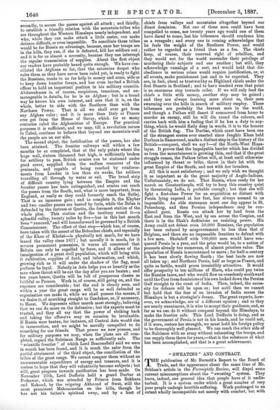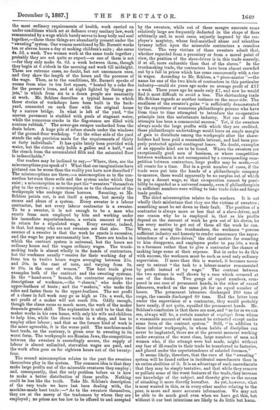"SWEATING" AND CONTRACT.
rrIHE publication of Mr. Burnett's Report to the Board of _1. Trade, and the appearance about the same time of Mr. Schloss's article in the Fortnightly Review, will dispel some current misconceptions about the " sweating " system. They leave, indeed, one general idea that people have of it undis- turbed. It is a system under which a great number of very poor people undergo horrible Buffering. Work prolonged to an extent wholly incompatible not merely with comfort, but with the most ordinary requirements of health, work carried on under conditions which set at defiance every sanitary law, work remunerated by a wage which barely serves to keep body and soul together,—these three things are abundantly present under the "sweating" system. One woman mentioned byMr. Burnett works ten or eleven hours a day at making children's suits ; she earns 4e. 3d. a week. Two women work at the same trade together ; probably they are not quite so expert—or one of them is not —for they only make 8s. 6d. a week between them, though they begin at 6 o'clock in the morning and work till midnight. These are extreme cases, no doubt, but not uncommon ones, and they show the length of the hours and the poorness of the wage. Then, as to the conditions, Mr. Burnett speaks of rooms from nine to ten feet square, "heated by a coke fire for the presser's irons, and at night lighted by flaring gas- jets," in which from six to a dozen people are constantly at work. Mr. Schloss describes a typical house in which three stories of workshops have been built in the back- yard, connected on each floor with the original house by a narrow bridge. In what is left of the yard, "the uneven pavement is studded with pools of stagnant water, while the numerous cracks in the flag-stones are filled with noxious rubbish." The sewer-gas escapes unchecked from the drain below. A huge pile of refuse stands under the windows of the ground-floor workshop. "At the other side of the yard stands the sole provision made for the requirements of thirty or forty individuals." It has quite lately been provided with water, but the cistern only holds a gallon and a half, "and the stench from the accumulated filth and the saturated floor is indescribable."
Our readers may be inclined to say,—' Where, then, are the misconceptions you speak of? What that our imaginations have pictured can be worse than the reality you have now described?' The misconceptions are three,—a misconception as to the con- nection between these evils and the system under which they exist ; a misconception as to the part the "sweaters" themselves play in the system ; a misconception as to the character of the workpeople who undergo these horrors. Sweating, as Mr. Schloss points out, is not itself a system, but merely the excess and abuse of a system. Every sweater is a labour contractor, but not every labour contractor is a sweater. To be a sweater, it is not enough to be a man who exacts from men employed by him and working under his immediate superintendence, a certain amount of work in return for a stipulated wage. Every sweater, indeed, is that, but many who are not sweaters are that also. The essence of a sweater is that the work he exacts is excessive, and the wage he pays unreasonably low. There are trades in which the contract system is universal, but the hours are ordinary hours and the wages ordinary wages. The trunk- making trade is almost wholly in the hands of contractors, but the workmen usually receive for their working day of from ten to twelve hours wages averaging between 25s. and 30s. in the cage of men, and varying from 9s. to 20s. in the case of women." The boot trade gives examples both of the contract and the sweating systems. In the " hand-sewn " branch, the contractor employs two descriptions of workmen,—the "closers," who make the upper-leathers of boots ; and the "makers," who make the soles and fasten them to the upper-leathers. The net profit of a closer in full work may go as high as 72s. a week, the net profit of a maker will not reach 30s. Oddly enough, though the closer earns so much more, the work of the maker demands greater skill. The explanation is said to be that the maker works in his own home, with only his wife and children to help him, while the closer works in a shop, and has to employ other labour ; and that as the former kind of work is the more agreeable, it is the worse paid. The machine-made boot trade, on the contrary, is given over to sweating in its worst form. The workpeople are Russian Jews, the competition between the sweaters is exceedingly severe, the supply of labour is almost unlimited, starvation wages are paid, and the work often goes on for eighteen hours out of the twenty- four.
The second misconception relates to the part the sweaters themselves play in the system. The common idea is that they make large profits out of the miserable creatures they employ ; and, consequently, that the only problem before us is how to make a better distribution of these profits. Nothing could be less like the truth. Take Mr. Schloss's description of the very trade we have last been dealing with the machine-made boot trade :—" As to the sweaters themselves, they are at the mercy of the tradesmen by whom they are employed ; no prices are too low to be offered to and accepted by the sweaters, while out of these meagre amounts sums relatively large are frequently deducted in the shape of fines arbitrarily and, in most case., unjustly imposed by the em- ployer's magistry, whose foul-mouthed abuse and relentless tyranny inflict upon the miserable contractors a ceaseless torture. The very victims of these sweaters admit that, whether regarded from a pecuniary or from a moral point of view, the position of the slave-driver is in this trade scarcely, if at all, more endurable than that of the slaves." In the trunkmaking trade, the contractors have been almost crowded out by a fall in prices which has come concurrently with a rise in wages. According to Mr. Schloss, a " piece-master "—the name for one of the two kinds of contractors in this particular industry—could six years ago make an average profit of £17 a week. Three years ago he made only £7, and now he would find it most difficult to avoid a loss. The shirtmaking trade Mr. Schloss regards as another instance on the same side. The smallness of the sweater's gains "is sufficiently demonstrated by the experience of numerous philanthropic persons who have from time to time attempted to introduce the co-operative principle into this unfortunate industry. Not one of these attempts has been a commercial success." Yet, if the sweaters always made the large profits with which they are credited, these philanthropic undertakings would leave an ample margin of gain to distribute among the workpeople after the share- holders had been paid a reasonable interest, and had been pro- perly protected against contingent losses. No doubt, examples of an opposite kind are to be found. Where the sweaters are exceptionally good men of business, or where competition between workmen is not accompanied by a corresponding com- petition between contractors, large profits may be made,—at all events for a time. But in a great number of cases, if the trade were put into the hands of a philanthropic company to-morrow, there would apparently be no surplus out of which to pay a decent wage, so that co-operation cannot by possi- bility be regarded as a universal remedy, even if philanthropists in sufficient numbers were willing to take trade risks and forego trade profits.
The third misconception relates to the workers. It is not wholly their misfortune that they are the victims of sweaters ; something must be set down to their fault. The position of a contractor is always more or leas that of a slave-driver, and one reason why he is employed is, that as his profits depend on the amount of work he gets out of his slaves, he has every motive to get out of them all the work he can. Where, as among the trunkmakers, the workmen "possess sufficient industry and honesty to render unnecessary the super- intendence of a slave-driver," the chief motive for resorting to him disappears, and employers prefer to pay 50s. a week to a foreman rather than to give a contractor the chance of snaking large sums at their expense. But in order to do this with success, the workmen must be such as need only ordinary supervision. If more than this is wanted, it becomes neces- sary to entrust "the task to a labour-master remunerated
by profit instead of by wage." The contrast between the two systems is well shown by a case which occurred at one of the docks. Two gangs of equal numbers, com- posed in one case of permanent hands, in the other of casual labourers, worked on the same job for an equal number of hours. The permanent labourers discharged 260 tons of cargo, the casuals discharged 60 tons. Had the latter been under the supervision of a contractor, they would probably have nearly, if not quite, equalled the permanent hands. Mr. Schloss's conclusion is that there are now, and "as far as we can see, always will be, a certain number of employe's from whom a reasonable amount of work cannot be extracted except under some form of the contract system." Still, "in addition to these inferior workpeople, in whom habits of discipline can never be implanted, there are at the present moment working under sweaters of the worst class, large numbers of men and women who, if the attempt were but made, might without any fear of ill-results to their trade be transferred to factories, and placed under the superintendence of salaried foremen." It Bee= likely, therefore, that the cure of the " sweating " system will be found rather in incidental amendments than in an entire abolition of it. It is an advantage of such amendments that they may be simply tentative, and that while they remove or palliate some of the worst features of the trade, they increase our knowledge of the subject, and thereby give us the means of attacking it more directly hereafter. As yet, however, what is most wanted in this, as in every other matter relating to the poor, is more and more accurate information. We may not be able to do much good even when we have got this, but without it our best intentions are likely to do little but harm.










































 Previous page
Previous page